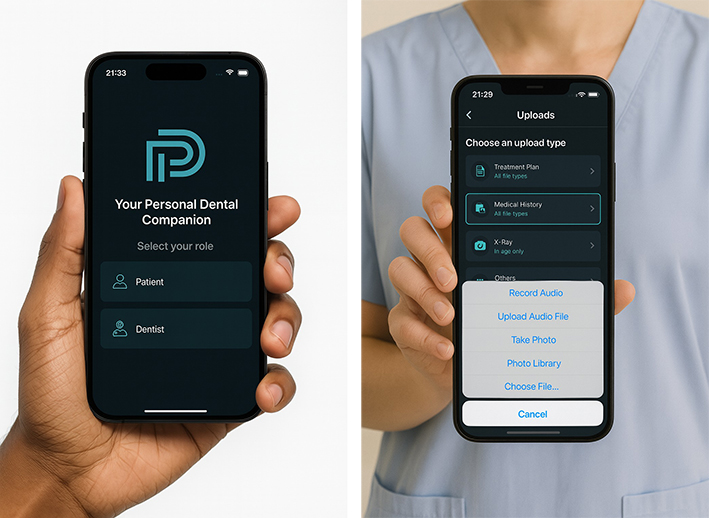Publications Hub, Treatment, Article
An AI-based app promises to strengthen the patient-clinician relationship
14 July 2025
The third prize in the EFP Digital Innovation Award 2025 was awarded to the Perioskoup project, an application which uses AI to strengthen the patient-clinician relationship by providing personalized at-home assistance. Prize-winner Anca Constantin explains the challenges that Perioskoup is designed to overcome and the potential that AI offers dentistry.

Perioskoup was born out of two big challenges that we face in practice: a shortage of time and the lack of patient adherence to treatment, which leads to poor outcomes. It also comes from a personal wish to contribute to providing accurate, personalized information for overall better oral health.
The aim of the Perioskoup app is to solve these problems, bridging the patient-clinician interaction and extending it beyond the appointment in the clinic. Thanks to artificial intelligence, it is very versatile and can easily be extended to assist non-periodontal specialists.
By using AI, Perioskoup enables clinicians to upload to the app every investigation, recommendation, and treatment plan for each patient. It comprises a voice-to-text feature that will help save chairside time by allowing dentists to record themselves, translating their speech into an editable text document that they can then assess and validate.
The patient uses the app as they would a chatbot, each time receiving entirely personalized answers and recommendations, as the AI has learned everything relevant about their specific case.
For the clinician, Perioskoup is designed to save chairside time, improve efficiency and treatment outcomes, and strengthen the connection with the patient. For patients, the app gets them involved in prevention and in their treatment outcomes, therefore enabling them to gain trust and a sense of control, which should improve their adherence to oral-hygiene routines and their commitment to their dental care.
Adding more features
We have faced challenges in trying to find the best features and solutions that would accommodate both the clinician and the patient, and we will continue to search and improve, adding more features as the app develops.
My wish from the start was that the app would be researched and used as much as possible to identify any shortcomings and to highlight ways to improve it. In relation to this, I start my PhD in October, where I will research in depth the application of AI in periodontology and implantology, and the app will be used as a research tool. My hope is that we will be able to make this research a multicentred endeavour and that we will be able to partner with other universities to get as accurate a perspective as possible.
Perioskoup is due to be available from autumn 2025. In the meantime, we already have the website and socials up and running, and we are inviting both patients and clinicians to visit them and to sign up to the waiting list.
The role of AI is growing rapidly across all domains of activity—and dentistry is no exception. We can either look at this with fear or with curiosity and proactive involvement, seeing it as an opportunity for growth. However, we also need to develop our discernment and critical thinking to be able to integrate AI healthily into our work.
It is a time of trial and error, and it is an honour and opportunity that we are part of it and that we can contribute to shaping the future of dentistry.
The EFP Digital Innovation Award—an annual prize that recognizes innovative digital projects designed to improve gum health globally—is supported by EFP partner Haleon.
More information about Perioskoup can be found at: www.perioskoup.com, Instagram:@perioskoup.ai, and LinkedIn: Perioskoup AI.
Biography

Anca Constantin graduated from the Carol Davila University of Medicine and Pharmacy in Bucharest, Romania and is currently undergoing her residency in periodontology the same university. Her clinical practice focuses mainly on periodontology and restorative dentistry. She is also starting her doctoral studies this year under the supervision of Professor Mihai Săndulecu, where she will focus on the applications of artificial intelligence in periodontology and implantology.




